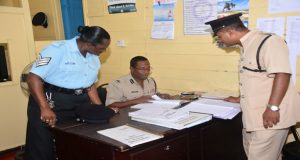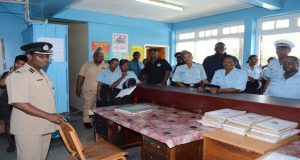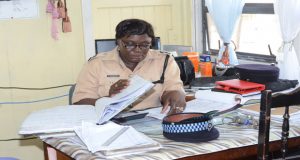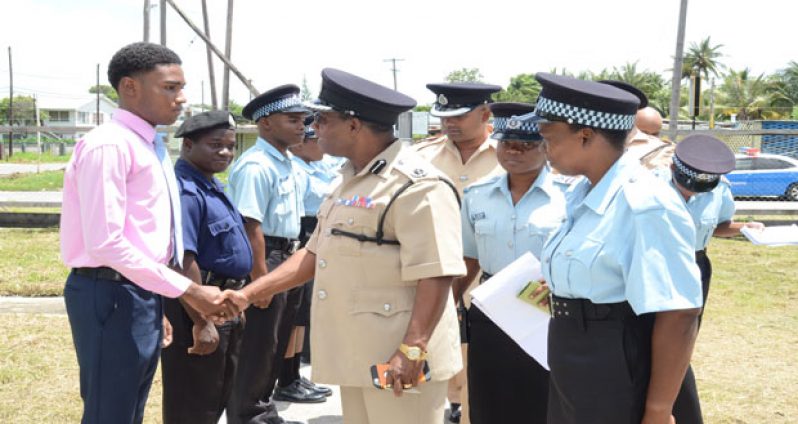ASSISTANT Commissioner of Police and ‘A’ Division Commander, Clifton Hicken read the “riot act” to ranks of the police ‘A’ Division during his mandatory half-yearly commander’s inspection of all police stations and outposts within the respective divisions.Commander Hicken addressed police officers on the following issues: mode of dress; their manner of communication with members of the public; conformity with the Standing Orders of the

Force; punctuality; rogue cops; records management; unauthorised dissemination of information; domestic violence; the care of state assets and corruption, among others.
The inspections began last week and will conclude today with the final inspection being the Brickdam Police Station, ‘A’ Division headquarters. Among the other stations inspected were those at Diamond, Grove, East Ruimveldt, East La Penitence, Kitty, Alberttown and Timehri. Inspections were also done at the North Ruimveldt, East Ruimveldt, Timehri and Madewini Outposts, as well as the Highway Base on the Soesdyke/Linden Highway.
Having completed his inspections, Commander Hicken told this publication that while he has seen room for improvement in the way certain things are done at some stations, he was pleased with the efforts put in by the ranks given the limited resources at their disposal and which were in all cases put to good use.
He stressed that the workload for police ranks is something that members of the public may not always understand, but was quick to point out that in an organisation such as the Guyana Police Force, members of the public could not care less about what resources are available and what are not, since their main concern is ensuring that the police force provides a service to them in keeping with their oath of office.
While addressing the ranks, Assistant Commissioner Hicken mentioned the observation that in most cases at the junior level, they neglect the poor and focus on the rich, because of the expectation of personal gains.
“You are neglecting the poor and focusing on the rich because you want gains and my take on that is that it is corruption, and if you are found culpable you will go before the courts and you will have your full share of the criminal justice system, because we are not going to sacrifice the majority for the minority, it’s the other way around,” Commander Hicken made clear.
Ranks were told that the Force is seeing an increase in the number of domestic violence cases and as a law- enforcement body; they are expected to investigate thoroughly each reported case and take the appropriate action. Mr. Hicken stressed that all ranks need to be equipped with knowledge of dealing with the issue of domestic violence and ignorance will not be accepted as an answer.
They were reminded too that each time they face a member of the public they do so as ambassadors of the sub-divisional officers, commanders, commissioner of police and by extension, the

Guyana Police Force. Against that backdrop, they ought be cognisant of the fact that the force is always under the scrutiny of their paymasters, who are the taxpayers of this country.
The issue of traffic ranks who are bringing the police force into disrepute was also mentioned by Hicken, who noted that the few who are behaving dishonourably will be weeded out.
“As of now, no minibus is to be emptied unless there is an accident or some emergency in terms of drugs or guns found inside the vehicle. Do not inconvenience the members of the public because you have the authority to do so; minibus drivers and conductors can be summoned, summon them to court; success rate is not by the number of people at stations, it’s counted by the number of successful prosecutions you have at the courts,” Hicken informed ranks.
There is often the claim by members of the public that whenever they visit certain police stations, not only in ‘A’ Division, but across the country, police ranks would usually instruct them to leave and return before their reports are entertained.
In most cases the excuses by the ranks are that the officer to deal with the matter is absent, or that the police do not have vehicles or manpower to act on reports, “that nonsense better stop and it better stop now,” said Hicken.
“You have no authority to tell members of the public that you do not have transportation and [it] is only one police [officer who is] working because as of now, I am making it clear: there will be no one police officer working by night or by day; and there is a Standard Operating Procedure in the division where you come to the duty officer and the duty officer will send the closest patrol, because we always have patrols out in the communities and station districts. So for you to tell members of the public that you do not have resources and vehicles are very disrespectful to them and it is laziness; so we will deal with you, we will send you on the road because you are embarrassing members of the Guyana Police Force.”

The issue of records management was also a point of discussion during the inspection, as ranks were reminded of the importance of proper management of records which often have to be referred to in future. It was noted that if the police force does not take records management seriously, then it has the potential to embarrass the organisation since any developing organisation must have a proper records system.
Police ranks that endanger the lives of their colleagues were also sternly warned against engaging in activities which have the potential to cause loss of lives and bring the Force into disrepute.
Hicken remarked that members of the public are afraid to share information with the junior ranks of the Force because some of them are collecting the information and re-channelling it for personal gain. Hence the decision of the Force to share the phone numbers of senior police officers, so that members of the public may have direct contact with them.
The Assistant Commissioner, while addressing the ranks stated: “While you are seeing your personal gains you are not seeing the dangers that you are putting your colleagues in, because information, if it is not properly shared, processed and filtered and transformed into the intelligence can hurt people.”
He further stated: “We have all these policemen and women here and you realise that people around you are doing illegal things, but you are not telling the police because you know that you are getting a drawback; it does not augur well for the Force. Because of your dishonesty, the whole Force is being stained because persons of questionable character are saying if you can take, then others can take too.”

The senior police officer emphasised that those caught in this practice will be investigated by the decentralised offices of the Force’s Office of Professional Responsibility (OPR), as he stressed too that no rank should be selling information to anyone.
The police force, he added, will share information with the media through the channels that are provided for doing so, but that will not be done prematurely, since it can have an impact on the outcome of investigations and does have the potential to jeopardise the work of investigating ranks.
During the inspections, station compounds, sanitary blocks, barrack rooms, kitchen facilities, log books, property room and other facilities which fall under the ambit of the respective stations, come under the commander’s microscope.
Commander Hicken was accompanied on his visits by his divisional crime officer, traffic officer and head of the firearm section as well as the sub-divisional officers.
By Leroy Smith



.jpg)









